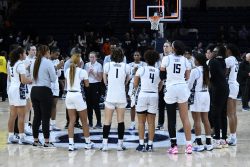Last week, news broke that Georgetown’s baseball program had committed major NCAA violations. Over a period of seven years the university unknowingly paid 26 players tens of thousands of dollars of unearned work-study pay, causing the NCAA to impose strict sanctions, including three years probation for the athletic department.
One week later, this shocking revelation has faded from view. The fall sports season has continued and ESPN’s Outside the Lines reporters are nowhere to be found. There’s been a noticeable lack of uproar.
Of course the athletic department’s reputation has been marred by the NCAA’s public reprimand, and $61,000 is no small financial penalty, but the fact of the matter is that the actual violations were discovered and addressed over two years ago. And three years of probation should not be hard to get through for a program that has never before committed major violations and is cracking down on compliance.
The limit of five baseball scholarships would seem to be the one real damaging punishment, but even before the University self-imposed that restriction in 2007, the team only used five equivalency scholarships out of the 11.7 allowed under NCAA rules.
“Had these student-athletes simply been given the money in the form of a scholarship, there would have been no problem,” interim athletic director Dan Porterfield said on a conference call regarding the violations.
As for forfeiting all wins involving the 26 players, well, it’s not a big loss considering the team did not have a winning season in any of the seven seasons in which the violations were committed.
Or as Porterfield put it, “The baseball program has not enjoyed a lot of competitive success.”
The two points Porterfield made frame the issue that is at the heart of the baseball program’s problems, both on and off the field: money.
Simply put, there isn’t enough of it. If the athletic department had made more than five scholarships available to the team, maybe the 26 players wouldn’t have needed work-study aid, avoiding this fiasco. And while you can’t buy wins, better facilities and equipment—not to mention higher recruiting budgets and coaching salaries—certainly wouldn’t hurt.
But the athletic department isn’t a charity. Baseball doesn’t have a big budget because it doesn’t bring in big money. It may not be fair, but there is a reason why basketball dominates the Hoya sports scene.
While men’s basketball brings in over $10.2 million in revenue in a year, according to Georgetown’s Title IX Disclosure for the 2007-08 school year (the most recent data available), baseball is not a so-called revenue sport. Indeed, all men’s sports, excluding basketball and football, brought in just over $4.3 million in revenue in 2007-08, with more successful on-campus sports like soccer and lacrosse likely accounting for a significant share of that figure.
With a “home” field located in Rockville, MD and a season that extends well beyond the end of spring semester (not to mention its recent futility), the baseball program is a long way away from being a cash cow for the University. Baseball is one of the more expensive sports on a per-participant basis, with operating expenses totaling $5,368 per player for the 2007-08 school year. And that only includes game day expenses like transportation and uniforms; the program likely runs up hundreds of thousands of dollars of other expenses such as salaries.
Such is the dilemma Georgetown’s baseball program finds itself in. It needs to spend money to succeed, but money only follows success. It’s sad that collegiate competition should be reduced to such a cold, calculating formula, but as last week’s revelations showed, it’s all about the money.
Georgetown will weather the sanctions, and baseball will continue to search for success. But for once, I’m sure the athletic department wishes it had splurged on a few extra scholarships for the baseball program.




